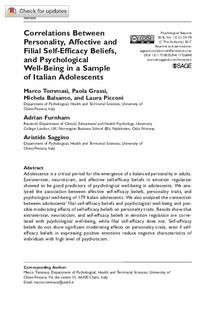| dc.contributor.author | Furnham, Adrian | |
| dc.contributor.author | Tommasi, Marco | |
| dc.contributor.author | Grassi, Paola | |
| dc.contributor.author | Balsamo, Michela | |
| dc.contributor.author | Picconi, Laura | |
| dc.contributor.author | Saggino, Aristide | |
| dc.date.accessioned | 2018-03-07T08:52:01Z | |
| dc.date.available | 2018-03-07T08:52:01Z | |
| dc.date.created | 2018-02-27T12:20:45Z | |
| dc.date.issued | 2018 | |
| dc.identifier.citation | Psychological Reports. 2018, 121 (1), 59-78. | nb_NO |
| dc.identifier.issn | 0033-2941 | |
| dc.identifier.uri | http://hdl.handle.net/11250/2489038 | |
| dc.description.abstract | Adolescence is a critical period for the emergence of a balanced personality in adults. Extraversion, neuroticism, and affective self-efficacy beliefs in emotion regulation showed to be good predictors of psychological well-being in adolescents. We analyzed the association between affective self-efficacy beliefs, personality traits, and psychological well-being of 179 Italian adolescents. We also analyzed the connection between adolescents' filial self-efficacy beliefs and psychological well-being and possible moderating effects of self-efficacy beliefs on personality traits. Results show that extraversion, neuroticism, and self-efficacy beliefs in emotion regulation are correlated with psychological well-being, while filial self-efficacy does not. Self-efficacy beliefs do not show significant moderating effects on personality traits, even if self-efficacy beliefs in expressing positive emotions reduce negative characteristics of individuals with high level of psychoticism. | nb_NO |
| dc.language.iso | eng | nb_NO |
| dc.publisher | Sage | nb_NO |
| dc.relation.uri | http://journals.sagepub.com/doi/abs/10.1177/0033294117720698?url_ver=Z39.88-2003&rfr_id=ori:rid:crossref.org&rfr_dat=cr_pub%3dpubmed | |
| dc.rights | Navngivelse-Ikkekommersiell 4.0 Internasjonal | * |
| dc.rights.uri | http://creativecommons.org/licenses/by-nc/4.0/deed.no | * |
| dc.title | Correlations Between Personality, Affective and Filial Self-Efficacy Beliefs, and Psychological Well-Being in a Sample of Italian Adolescents. | nb_NO |
| dc.type | Journal article | nb_NO |
| dc.type | Peer reviewed | nb_NO |
| dc.description.version | publishedVersion | nb_NO |
| dc.source.pagenumber | 59-78 | nb_NO |
| dc.source.volume | 121 | nb_NO |
| dc.source.journal | Psychological Reports | nb_NO |
| dc.source.issue | 1 | nb_NO |
| dc.identifier.doi | 10.1177/0033294117720698 | |
| dc.identifier.cristin | 1569038 | |
| cristin.unitcode | 158,4,0,0 | |
| cristin.unitname | Institutt for ledelse og organisasjon | |
| cristin.ispublished | true | |
| cristin.fulltext | original | |
| cristin.qualitycode | 1 | |

